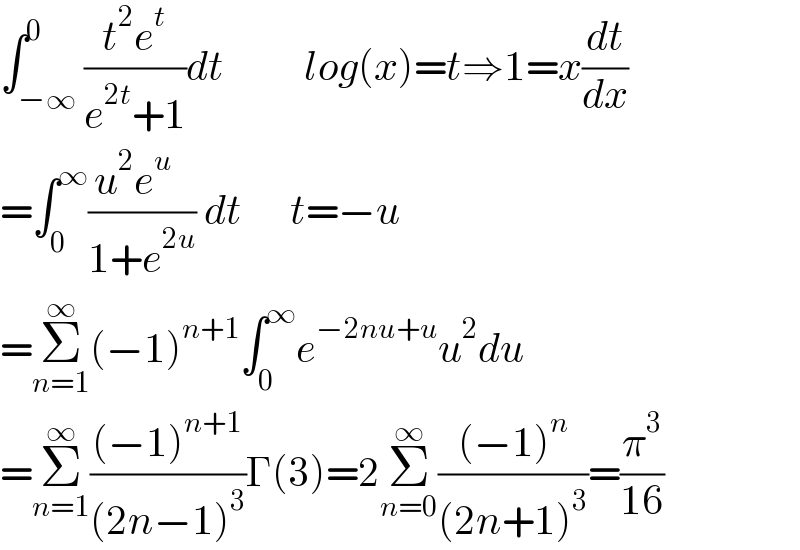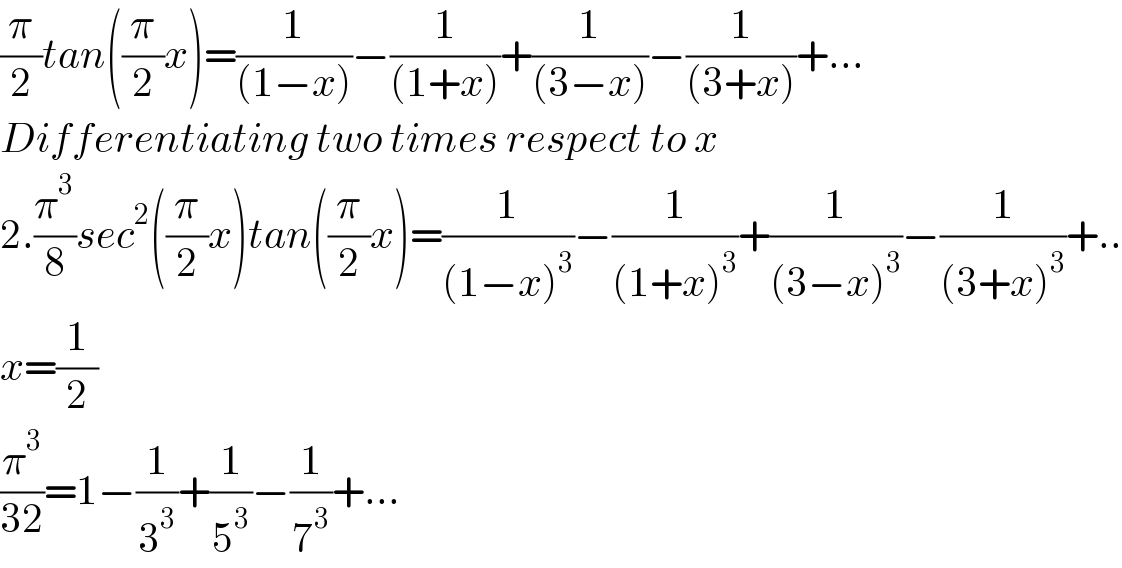Question Number 133518 by Abdoulaye last updated on 22/Feb/21

Answered by mnjuly1970 last updated on 22/Feb/21

$${ans}:\:\frac{\pi^{\mathrm{3}} }{\mathrm{16}} \\ $$
Answered by Dwaipayan Shikari last updated on 22/Feb/21

$$\int_{−\infty} ^{\mathrm{0}} \frac{{t}^{\mathrm{2}} {e}^{{t}} }{{e}^{\mathrm{2}{t}} +\mathrm{1}}{dt}\:\:\:\:\:\:\:\:\:\:{log}\left({x}\right)={t}\Rightarrow\mathrm{1}={x}\frac{{dt}}{{dx}} \\ $$$$=\int_{\mathrm{0}} ^{\infty} \frac{{u}^{\mathrm{2}} {e}^{{u}} \:\:}{\mathrm{1}+{e}^{\mathrm{2}{u}} }\:{dt}\:\:\:\:\:\:{t}=−{u} \\ $$$$=\underset{{n}=\mathrm{1}} {\overset{\infty} {\sum}}\left(−\mathrm{1}\right)^{{n}+\mathrm{1}} \int_{\mathrm{0}} ^{\infty} {e}^{−\mathrm{2}{nu}+{u}} {u}^{\mathrm{2}} {du} \\ $$$$=\underset{{n}=\mathrm{1}} {\overset{\infty} {\sum}}\frac{\left(−\mathrm{1}\right)^{{n}+\mathrm{1}} }{\left(\mathrm{2}{n}−\mathrm{1}\right)^{\mathrm{3}} }\Gamma\left(\mathrm{3}\right)=\mathrm{2}\underset{{n}=\mathrm{0}} {\overset{\infty} {\sum}}\frac{\left(−\mathrm{1}\right)^{{n}} }{\left(\mathrm{2}{n}+\mathrm{1}\right)^{\mathrm{3}} }=\frac{\pi^{\mathrm{3}} }{\mathrm{16}} \\ $$
Commented by Dwaipayan Shikari last updated on 22/Feb/21

$$\frac{\pi}{\mathrm{2}}{tan}\left(\frac{\pi}{\mathrm{2}}{x}\right)=\frac{\mathrm{1}}{\left(\mathrm{1}−{x}\right)}−\frac{\mathrm{1}}{\left(\mathrm{1}+{x}\right)}+\frac{\mathrm{1}}{\left(\mathrm{3}−{x}\right)}−\frac{\mathrm{1}}{\left(\mathrm{3}+{x}\right)}+… \\ $$$${Differentiating}\:{two}\:{times}\:{respect}\:{to}\:{x} \\ $$$$\mathrm{2}.\frac{\pi^{\mathrm{3}} }{\mathrm{8}}{sec}^{\mathrm{2}} \left(\frac{\pi}{\mathrm{2}}{x}\right){tan}\left(\frac{\pi}{\mathrm{2}}{x}\right)=\frac{\mathrm{1}}{\left(\mathrm{1}−{x}\right)^{\mathrm{3}} }−\frac{\mathrm{1}}{\left(\mathrm{1}+{x}\right)^{\mathrm{3}} }+\frac{\mathrm{1}}{\left(\mathrm{3}−{x}\right)^{\mathrm{3}} }−\frac{\mathrm{1}}{\left(\mathrm{3}+{x}\right)^{\mathrm{3}} }+.. \\ $$$${x}=\frac{\mathrm{1}}{\mathrm{2}} \\ $$$$\frac{\pi^{\mathrm{3}} }{\mathrm{32}}=\mathrm{1}−\frac{\mathrm{1}}{\mathrm{3}^{\mathrm{3}} }+\frac{\mathrm{1}}{\mathrm{5}^{\mathrm{3}} }−\frac{\mathrm{1}}{\mathrm{7}^{\mathrm{3}} }+… \\ $$
Commented by Abdoulaye last updated on 22/Feb/21

$${what}\:{it}'{s}\:\Gamma? \\ $$
Commented by Dwaipayan Shikari last updated on 22/Feb/21

$${Gamma}\:{function} \\ $$$$\Gamma\left({a}\right)=\int_{\mathrm{0}} ^{\infty} {t}^{{a}−\mathrm{1}} {e}^{−{t}} {dt} \\ $$
Commented by Abdoulaye last updated on 22/Feb/21

$${thank}\:{you}\:{very}\:{much} \\ $$
Commented by Abdoulaye last updated on 23/Feb/21

$${how}\:{did}\:{you}\:{find}\:\frac{\Pi}{\mathrm{2}}{tan}\left(\frac{\Pi}{\mathrm{2}}{x}\right)=\frac{\mathrm{1}}{\left(\mathrm{1}−{x}\right)}−\frac{\mathrm{1}}{\left(\mathrm{1}+{x}\right)}+\frac{\mathrm{1}}{\left(\mathrm{3}−{x}\right)}−\frac{\mathrm{1}}{\left(\mathrm{3}+{x}\right)}+…\:\:? \\ $$
